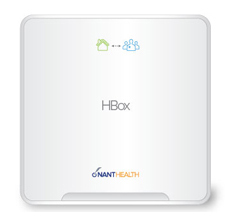 BlackBerry and NantHealth are working together to create the second generation of NantHealth's HBox, a portable device that captures and transmits secure medical data between the patient, doctor and hospital. It will use technology from QNX Software Systems, a subsidiary of BlackBerry.
BlackBerry and NantHealth are working together to create the second generation of NantHealth's HBox, a portable device that captures and transmits secure medical data between the patient, doctor and hospital. It will use technology from QNX Software Systems, a subsidiary of BlackBerry.
“With HBox, we have created a ‘human signal’ capturing device that automatically and securely transmits, through our HIPAA-compliant ‘NantCloud,' critical medical data and vital signs to the mission control center,” Dr. Patrick Soon-Shiong, founder and CEO of NantHealth, said in a statement. “Instantly and safely connecting the patient with the doctor and hospital allows for a higher quality of healthcare, expediting diagnosis and treatment, as well as more efficiently and accurately providing vital information into the hands of those in need.”
The first generation of HBox is already in 250 hospitals and transmits 3 billion vital signs annually according to the companies. But what BlackBerry's partnership will add to the equation is enterprise mobility security. Over the next few months, the device will be incorporated with BlackBerry’s BES enterprise mobility management platform, which will allow HIPAA-compliant encryption of medical data and compatibility with a range of legacy computers and other devices running in hospitals.
“Combining BlackBerry’s embedded software reliability, mobile device management and security technology with NantHealth’s ability to develop leading health care devices and platform creates a powerful strategic relationship,” John Chen, Executive Chairman and CEO of BlackBerry, said in a statement. “We look forward to continued collaboration where we leverage our respective strengths to improve patient healthcare.”
BlackBerry's relationship with NantHealth is nothing new. The two companies were talking about this kind of a partnership -- particularly Nant Health taking advantage of BlackBerry's QNX operating system -- when BlackBerry made a large investment in Nant Health last April.
In addition, last month the two companies launched the NantOmics Cancer Genome Browser, an app for the BlackBerry passport smartphone that allows doctors to compare the genetics of individuals at a highly granular level, which helps oncologists deliver the best personalized treatment to each patient. That technology similarly relied on BlackBerry's infrastructure to keep patient data safe and secure.
“The proprietary NantOmics Cancer Genome Browser enables clinicians for the first time to investigate a tumor genome from the full three billion bases down to the single-base level in real-time, thanks to the power of the NantOmics supercomputing infrastructure,” Soon-Shiong said at the time. “This integrates with NantHealth’s treatment recommendation engine, Eviti, to personalize treatment protocols to individual patients based on their genomic signature.”


















